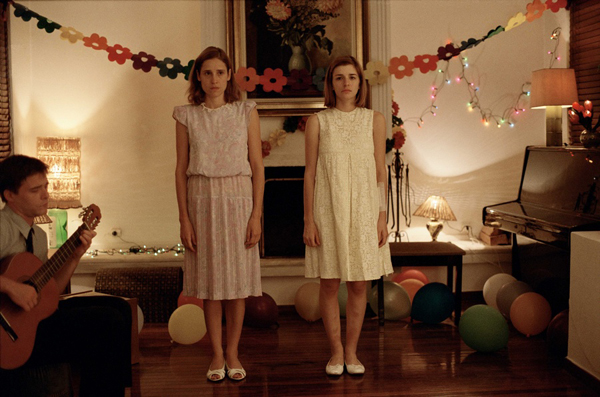Review: Dogtooth
Written by Sunrise Tippeconnie

Dogtooth Still
One of the greatest aesthetic strengths of Dogtooth’s execution is perhaps its implicit nature, one that intentionally confuses and overwhelms to illustrate the horrific outcomes of a concerned parental nature. Director Giorgos Lanthimos gives little exposition to grasp, expecting an attentive audience to catch the complex designs of the world created by the Greek parents of secluded children, but also to ignite an empathetic confusion that these children would experience if allowed to view the world beyond their parent’s design. The film’s approach towards audience engagement is unconventional, yet brilliantly metaphoric (hence it’s Un Certain Regard award), yet Dogtooth is also quite traditional in its coming-of-age themes and agenda, all appropriate combinations for a world cinema classic.
The film starts with some initially innocent moments, in which three siblings listen to a homemade instructional audio tape that illustrates definitions for words, but adventurous words like “sea” and “excursion” are given other meanings, “sea” is a word that describes a leather chair, while “excursion” is a “resistant material used to construct floors.” The children are simultaneously introduced, as they listen to these definitions, confused and distracted by other ideas that seem to form revolving about competitive games of endurance (the youngest sibling suggests a game in which they all place their hands beneath hot water to see whom can remain the longest).
While this moment that introduces parent-imposed rules, and the children resolution of mis-direction, is surreal it is where our attention is focused that suggests the real misfortune. Instead of giving attention to performance, or character, the audience is immediately struggling to comprehend the meaning behind these false connections. This initial audience-subject (non)interaction suggests a larger inhumanity beyond simply re-designed definitions and the games, we are made to ignore the real emotions of fear and painful confusion to focus on semantics and structural codes. These thought processes mirror the initial reactions to any real-world situations of a similar nature, and our identification with these emotional problems comes too late for any safe resolutions.
While these false-definitions and games suggest a specific critical analysis of Greece’s educational system, it also begins a larger analysis of the international fear of external forces overtaking traditional/domestic values. The father of this family is declared as the only one able to safely leave the house grounds, and fears are instilled of any other external interactions. In one instance a cat, found in their yard, is fearfully and violently attacked. This shocking moment reinforces the point of unnecessary cruelty and further argues against false tales that border on the propagandistic. These fears and anxieties are not just Greek, but can be found as part of any country’s international stance on “terrorism,” or even against another country’s oppositional political agenda. The threat against any one country’s homogenized ideas is ultimately not that of external forces, but those oppressed within these arbitrary confines.
What further reinforces the allegory of political structures of fear and power, the parents are powerful enough to instill hopes and dreams of connection with the impossible: every time a plane flies overhead, the children express their desires to catch it when it falls. This impossible dream reinforces parental control, as they know these children will never be able to achieve this dream and there is no danger of their desires leaving the safety of their control. To appease them, the mother tosses a small toy plane into the back yard, as the children race excitedly to connect with the one approved interaction with the world beyond their own. But, the mother can only quench these desires for so long, as dreams tend to expand into greater and more emotionally complex needs. The hope and strength of these dreams find their way into the head of the eldest daughter, who finds ways to subvert these house rules to expand her continued desire to know more. Her attempts turn heroic, as she continually surprises in her ingenuity to finds ways to interact with outside world. The moment of true audience comfort and identification comes when she gains access to smuggled VHS tapes of Avildsen’s Rocky and Spielberg’s Jaws, which not only open up positive emotions of humor and inspiration, but also a multitude of Pandoric doors that lead to both hope and suppression.
Instead of a healthy relationship between family members and appropriate development into adulthood, these imposed restraints begin to breed illiteracy, unemployable life skills, unrealistic dreams, jealousy and animosity. When the father chastises a young woman for introducing his daughter to Rocky and Jaws, he reacts violently upon her and curses her “I hope your kids have bad influences and develop a bad personality.” This is perhaps a direct attack not only on American culture, but upon the hypocritical stance taken by any country against opposing forms of ideology.
In the end, the father becomes the nightmare his rules are meant to prevent, and questioning the hypocrisy of such ridiculously deluded solutions of seclusion are what seems successfully revealed in Dogtooth. It is this young woman’s struggle to overcome these rules that Lanthimos masterfully defines as a universal metaphor for a younger generation’s attempts to define their own ways of functioning in a world rife in confusion, pain, and ultimately ambiguous achievement.